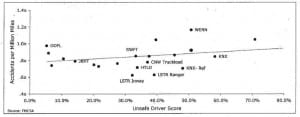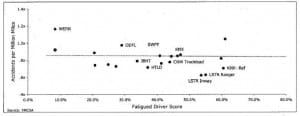On July 16, 2012, ASECTT (the Alliance for Safe, Efficient and Competitive Truck Transportation), four other trade associations and twelve named plaintiffs sued the FMCSA over its May 16th publication of “New Resources Available for Shippers, Brokers, and Insurers” on its website. This guidance makes clear that the FMCSA does not intend to perform its job under existing statute of determining which carriers are fit to operate on the highways and shutting down the rest. Through the publication of CSA/SMS data and this guidance, the FMCSA is harming safe small carriers who are not inspected often enough to generate a reliable score; large safe carriers who happen to operate in the five states that generate 46 percent of all speeding tickets or warnings; and shippers and brokers who are targeted by lawyers for negligent hiring and vicarious liability lawsuits despite contracting with carriers that have been authorized by the DOT to operate in interstate commerce.
The worst aspect of this is that SMS scores have no correlation to accident frequency rates for individual carriers, so all of this damage is being done without any positive impact on highway safety. There are now three studies that conclusively show the lack of correlation. On July 2, Anthony Gallo of Wells Fargo published “CSA: Another Look with Similar Conclusions” which stated, “…, we do not believe stakeholders should rely on CSA BASIC scores as an indicator of carrier safety performance or future crash risk.” The study was based on SMS scores and accident frequency data for 4,600 carriers with a minimum of 25 trucks and 50 inspections in the last 24 months. Also in early July, James Gimpel, a professor at the University of Maryland published “Statistical Issues in the Safety Measurement and Inspection of Motor Carriers.” The study points out numerous geographic deficiencies of the methodology that penalize carriers for where they operate, not how safely they operate. The study also challenges the deficiencies of SMS with regard to large versus small carriers. Data with fewer than 20 observations are not considered to meet a sufficient level of accuracy and most studies would not even publish such sparse data, but only 5 roadside inspections in the last 24 months are deemed sufficient under FMCSA’s methodology to brand a carrier as high risk. Analyzing data for tens of thousands of carriers the study showed little or no correlation between SMS scores and accident frequency. Finally, Transplace’s Director of Engineering, Inam Iyoob, published a study that also measured data for tens of thousands of carriers and found no relationship between SMS scores and individual carrier accident frequency.
The FMCSA continues to tout its studies showing a positive correlation between SMS scores and accident frequency, but to get that result they average the accident frequency of hundreds of carriers in each of 100 different percentiles and then calculate a regression of the average values. The purpose of regression analysis is to explain variation. Averaging hundreds of carriers at each percentile eliminates most of the variation in the data.
Logically, unsafe driving and driver fatigue do impact crashes. However, the way the SMS BASICs Unsafe Driving and Fatigued Driving are captured, calculated and interpreted by FMCSA does not show any correlation to crashes. Hence, usage of SMS data for carrier selection will unduly favor some and penalize others, and thus should be avoided.
A 32-year veteran in the logistics technology, third-party logistics (3PL), and transportation industries, Tom Sanderson is CEO of Transplace, a leading provider of logistics management services and technology. Prior to joining Transplace, Mr. Sanderson held various leadership positions, including president and CEO of Clicklogistics, co-owner and president of PTCG, and he worked 8 years in the trucking industry, serving as president of J.B. Hunt Special Commodities, Inc., Vice President of Marketing for J. B. Hunt Transport, Vice President of J. B. Hunt Logistics (now Transplace), as well as marketing and IT roles at Schneider National. He has 6 years of consulting experience with Mercer Management Consulting and Andersen Consulting (now Accenture). He has an MBA from Indiana University, has been married for 30 years and has three children



















